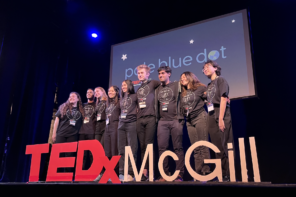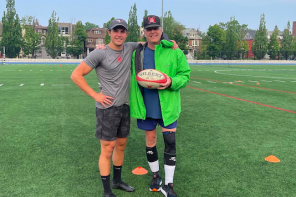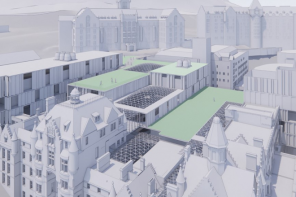Despite the rain and freezing temperature, masses of McGill students, faculty, and Montreal community members gathered at the steps of Milton Gates on October 31 to call for a name change for McGill’s varsity men’s team. The name “Redmen”, which has been in use for a little under a century, is being challenged due to its links to racial stereotyping of Indigenous people.
The protest was organized by Tomas Jirousek, a third-year political science major, student-athlete, and member of the Kainai First Nation of Alberta. He is the Chair of the Indigenous Affairs Committee and SSMU Commissioner of Indigenous Affairs. This year, he is leading the charge on an issue that has been brought up by Indigenous students time and time again, finally culminating in the creation of a Provost Task Force on Indigenous Studies and Indigenous Education.
The Task Force’s Final Report of 2017 stated “Our community questioned seriously the credibility of the University’s efforts in relation to Indigeneity given the pejorative connotation of our men’s varsity team name the Task Force calls on our University to begin a process of consultation inside McGill with the goal of renaming McGill male varsity teams. This consultation should engage all parts of the McGill community by the pressing importance for the future of moving forward under a McGill team name that breaks with the associations that ‘Redmen’ evokes in contemporary society. ”
A new men’s varsity team name for McGill is not a new concept. “We just are the latest generation of Indigenous students to call on the university to change the Redmen name,” said Jirousak on Wednesday afternoon as part of his opening statements, “It shouldn’t take the university this [long] to listen to us.”
Many who don’t find issue with the name claim that the origin of the Redmen team name came from James McGill’s Scottish heritage (due to the cultural stereotype of Scots being red-headed), or simply the colour of the jerseys its varsity team wore. These individuals claim that the name itself is not inherently rooted in racist stereotypes in the same way that others are, including the Cleveland Indians, Chicago Blackhawks, or the Kansas City Chiefs.
In an article written for the Montreal Gazette on October 18, entitled “McGill Redmen Should Keep their Name,” Martin Patriquin writes, “‘Redmen’ is a nod to school, not skin, colour. If the McGill Redmen are guilty of anything, it’s only by association.” He emphasizes this point by claiming that changing the name would only enforce the idea that it was meant to refer to those stereotypes, thereby giving them “power and legitimacy.”
A response to Patriquin’s article was later published by the McGill Chair of the Indigenous Studies program, Christa Scholtz, explaining that, “An original meaning is important, but that doesn’t necessarily prevail over all that comes after…. past stereotypes are indeed weighty things. We can be principled when we say that the inclusion of Indigenous voices in our university is a value that outweighs these particular six letters on the jersey, however long and storied its pedigree.”
An original meaning is important, but that doesn’t necessarily prevail over all that comes after…. past stereotypes are indeed weighty things.
“If Indigenous students are telling you that it’s harming them, and that it’s making them feel unsafe or unincluded on campus, I think that matters more than what you personally think,” explained Jennifer Chan, the VP External of the Political Science Students’ Association (PSSA), in reference to those who oppose the motion to change the name. “If your identity isn’t in question, I don’t think it’s fair for you to diminish the actual lived experiences and emotions of Indigenous students on this campus.”
So if original meaning isn’t what’s being debated, then why hasn’t the name been changed? Chan has some insight into this. “It’s brought up every year and the answer is always [the] donors. It’s always about money and how we’re not going to be able to get funding if the alum don’t like it…. It’s just gotten to a point where it’s so shameful that we haven’t changed it.”
The university fears that many alumni, who McGill depends on for donations, are attached to the nostalgia of ‘Redmen’, the same team name they had when they were students. However, some speakers at the protest, including Indiana-University and Purdue University Indianapolis Professor, Jennifer Guiliano, claimed that changing the name would cast a light on the University as a progressive institution, and might actually encourage more alumni to donate who had previously been opposed to the name.
One of the main speakers at the protest was Nakuset, a Cree woman and the Executive Director of the Native Women’s Shelter of Montreal. She is an influential activist for Indigenous rights and awareness and spoke about how the Redmen name, and others like it, aim to romanticize Indigenous culture and portray the strength of First Nations people without acknowledging the oppression that they face. “I don’t know what it is about the culture of Canada and the United States where they want to use our people in a way [that] represent[s] something strong… They’ll call their car Cherokee, or they’ll put our nation on a sports team…but [they forget to] look at what colonialism has done to our people, and … see how we have suffered, and we continue to suffer.”
“The struggles we go through are not what this university really wants as a team name,” she continued, “They want the strength and the power that you see standing before you today… that’s what they’re trying to cash in on. We are struggling and you are wearing our name like some kind of badge. And it doesn’t belong to you.”
The struggles we go through are not what this university really wants as a team name. They want the strength and the power that you see standing before you today… that’s what they’re trying to cash in on.”
McGill’s history with the Indigenous student minority is pervasive not only in its team name but also in its program of studies. “McGill overlooks the voices of Indigenous students in so many ways,” says Janelle Bruneau, a U3 geography student and an Indigenous woman from the Deh Cho Dene territory. “We only got an Indigenous Studies program in 2014, and even then the program only offers a minor. We are decades behind other post-secondary institutions in hiring Indigenous instructors, recruiting Indigenous students, and incorporating Indigenous context and voices into course material. McGill can be a very harmful place for Indigenous students.”
The call to change the men’s team name has also led to other questions about the representation of McGill’s founders and history, namely the glorification of James McGill, who was a slave owner, and Stephen Leacock (the namesake of many buildings on campus), a writer who expressed imperialist ideology and was opposed to women’s rights to vote.
One of the goals of the protest was to raise awareness and encourage students to vote in the SSMU referendum from November 9 to November 12 to change the name, and to sign the open letter initiative.
Christopher Manfredi, the Provost and Academic VP, sent out an email to the McGill community on October 23, stating that the procedure of changing the name will be lead by The Working Group on Principles of Commemoration and Renaming, which is co-chaired by Deans Robert Leckey and Anja Geitmann, whose final report is expected in December.
For any Indigenous people seeking support for any trauma that may have re-arisen or been triggered as a result of the debate surrounding the name change, the following organizations can provide support and community:
First People’s House https://www.mcgill.ca/fph/welcome
Native Friendship Centre Montreal http://nfcm.org/
Native Montreal http://www.nativemontreal.com/en/home/about-us.html?lang=EN
Indigenous Student Alliance: https://ssmu.ca/clubs/political-socialactivism-clubs/indigenous-student-alliance/
We Matter Campaign: https://wemattercampaign.org/
As well, students may find other resources here.








